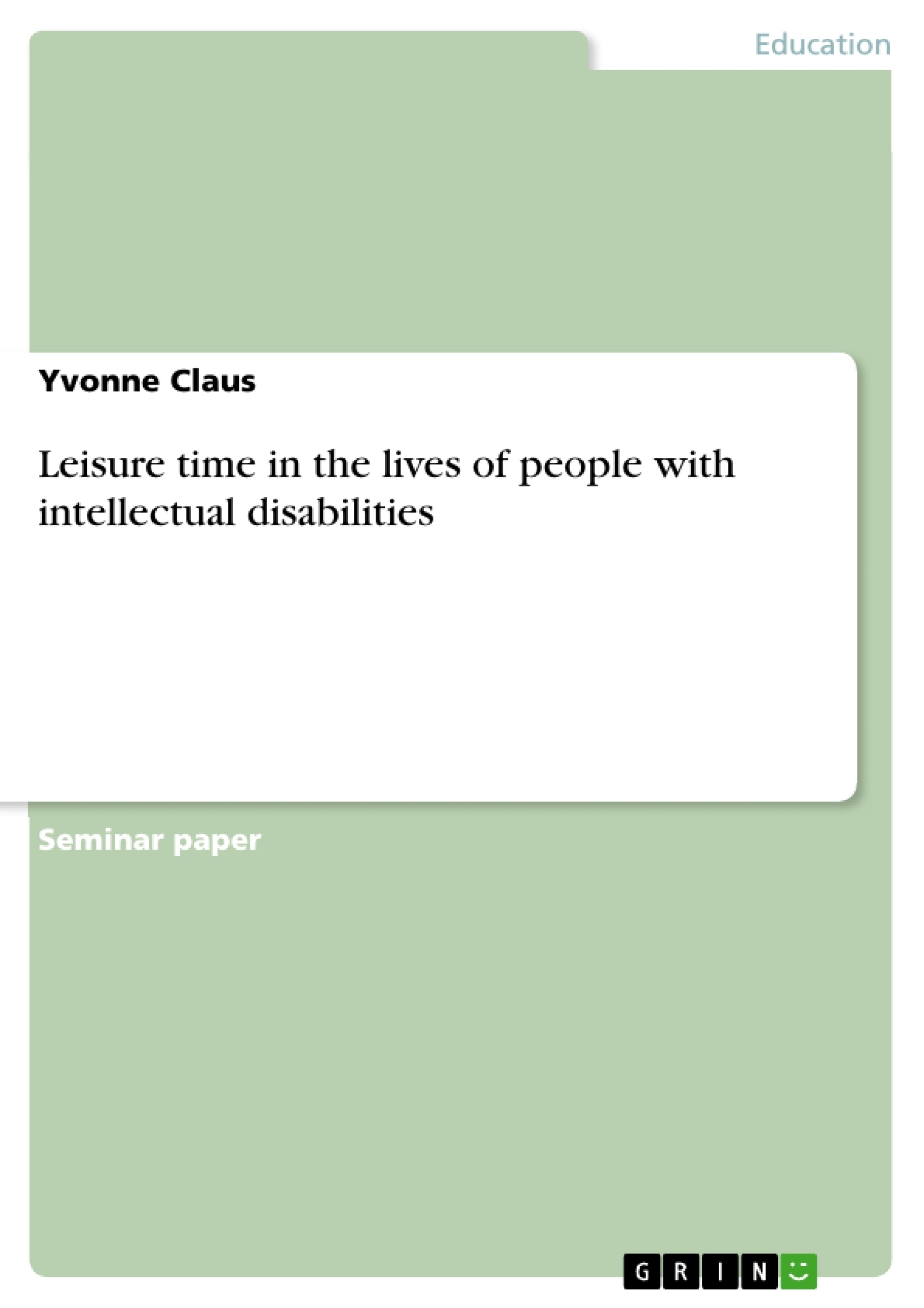Leisure time and leisure activities are a very important part of the social rehabilitation of people with intellectual disabilities. It offers the opportunity to eliminate exclusions and promote social integration. The offer of leisure time, education and cultural participation is as important for a meaningful and self-determined life as work. "Especially (above all) the field of leisure is attributed a fundamental (original) importance for life realisation, life satisfaction and life happiness, since leisure, unlike work, is not subject to coercion or pressure to perform, but is based on voluntariness, freedom and self-decision" (Theunissen 1995, p.70).
In this paper I would like to deal with the topic of "leisure time in the lives of people with intellectual disabilities". In doing so, I would like to find answers to the following questions: What leisure needs do mentally disabled people have and what might influence them? What does the leisure situation of people with intellectual disabilities look like? What tasks does this give rise to for leisure time education?
For the elaboration I mainly used books by H. Ebert, R. Markowetz and H. Opaschowski. To supplement my notes, I used literature by Zielniok, Theunissen and others.
First, I will go into more detail about Opaschowski's positive concept of leisure time, as this can be applied to all population groups and is therefore also valid for people with disabilities. Then I will talk about leisure needs and the difficulties they face. I will then discuss the question of the leisure situation in order to be able to better explain the tasks and goals of leisure education.
Inhaltsverzeichnis (Table of Contents)
- Introduction
- circle
- leisure
- Definition of leisure
- Leisure needs
- Leisure activities
- On the situation of leisure time for people with intellectual disabilities
- Empirical studies on the leisure situation
- Summary and interpretation
- Recreational education for people with intellectual disabilities
- Importance of leisure education
- Tasks and objectives of leisure education
- Forms of leisure activities
- summary
- Bibliography
Zielsetzung und Themenschwerpunkte (Objectives and Key Themes)
This work aims to explore the topic of "Leisure time in the life of people with intellectual disabilities." It seeks to understand the leisure needs of individuals with intellectual disabilities and identify the factors that influence these needs. Furthermore, it examines the current leisure situation of people with intellectual disabilities, including their access to recreational opportunities. Finally, the work analyzes the role of leisure education in promoting meaningful leisure experiences for individuals with intellectual disabilities.
- The definition and importance of leisure time for all individuals, particularly those with intellectual disabilities
- The specific leisure needs of individuals with intellectual disabilities and the factors that influence these needs
- The current leisure situation for people with intellectual disabilities, including challenges and opportunities
- The role of leisure education in promoting social inclusion and meaningful leisure experiences for people with intellectual disabilities
Zusammenfassung der Kapitel (Chapter Summaries)
The introduction outlines the significance of leisure time for the social rehabilitation and inclusion of individuals with intellectual disabilities. It also highlights the importance of leisure education in promoting self-determination and a meaningful life.
The chapter on "circle" discusses the characteristics of individuals with intellectual disabilities and emphasizes the need for individualized recreational educational measures tailored to their unique needs and preferences. It addresses the dependence of individuals with intellectual disabilities on support and stimulation from their environment to engage in meaningful leisure activities.
The chapter titled "leisure" begins by defining leisure in the context of increasingly shorter working lives and exploring different leisure concepts. It then introduces Opaschowski's positive concept of leisure, which emphasizes the importance of free choice, self-decision, and social action. The chapter further examines the three time periods: disposition time, obligation time, and determination time, providing a nuanced understanding of the concept of leisure.
Schlüsselwörter (Keywords)
The primary focus of this work lies on the exploration of leisure time and its significance for individuals with intellectual disabilities. Key terms include intellectual disability, leisure needs, leisure situation, leisure education, social inclusion, self-determination, and individualized recreational educational measures.
Frequently Asked Questions
Why is leisure time important for people with intellectual disabilities?
Leisure time is crucial for social rehabilitation, promoting integration, and enhancing life satisfaction by providing opportunities for self-determination and joy without performance pressure.
What is Opaschowski's positive concept of leisure?
It is a concept valid for all population groups that emphasizes free choice, social action, and the ability to decide for oneself how to spend time.
What are the main tasks of leisure education?
Leisure education aims to stimulate interests, provide support for independent activities, and create accessible environments for social inclusion.
What factors influence the leisure needs of people with disabilities?
Needs are influenced by personal preferences, the level of required support, social environment, and the availability of inclusive recreational facilities.
What is the difference between obligation time and determination time?
Obligation time refers to necessary tasks (like work or self-care), while determination time is the period where an individual has the freedom to choose their own activities.
- Citation du texte
- Yvonne Claus (Auteur), 2003, Leisure time in the lives of people with intellectual disabilities, Munich, GRIN Verlag, https://www.grin.com/document/1150699



